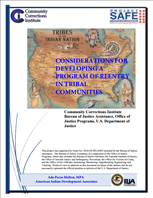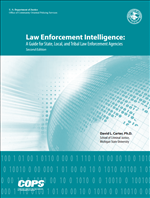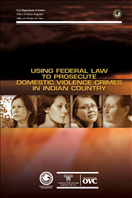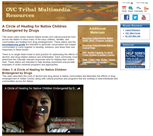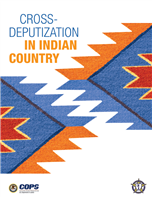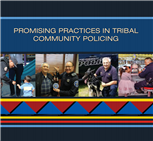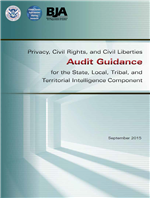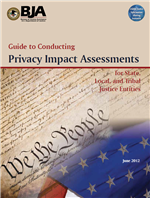Considerations for Developing a Program of Reentry in Tribal Communities
Nationally, reentry is a growing concern shared by tribal governments. Tribal governments are becoming more proactive as they look for options and ways to meet the reentry and reintegration needs and concerns of American Indian and Alaska Natives (AI/AN) ex-offenders or re-entrants and the tribal communities they may return to upon release.
Law Enforcement Intelligence: A Guide for State, Local, and Tribal Law Enforcement Agencies
Law Enforcement Intelligence: A Guide for State, Local, and Tribal Law Enforcement Agencies is a policy oriented review of current initiatives, national standards, and best practices. This Guide is intended to support policy in law enforcement agencies and seeks to objectively provide the best knowledge and practice of law enforcement intelligence at the time of publication. It is not meant as an academic work nor does it look at theoretical issues or arguments. It is not directed as a guide to the intelligence community except to explain the roles, responsibilities, and restrictions of the intelligence community's state, local, and tribal law enforcement partners.
Using Federal Law To Prosecute Domestic Violence Crimes in Indian Country
This DVD and companion facilitator's guide provide guidance on how to successfully prosecute in federal court domestic violence offenders who commit crimes in Indian Country. The video incorporates case studies of actual prosecutions, while the guide provides an overview of relevant legal principles and key points for discussion. The materials also discuss circumstances common in tribal domestic violence prosecutions, such as offender recidivism, recanting victims, safety planning, and federal and tribal criminal justice and social service professionals working collaboratively to ensure victims' safety and community justice.
Tribal Oriented Policing Strategies (TOPS) – Online Training
This is an online training consisting of portions of the classroom TOPS training. Four comprehensive online modules cover topics including: positive ethics, communication, leadership styles, identifying key stakeholders, partnership building, a six-step problem-solving model, and examples of success are covered.
Tribal Oriented Policing Strategies (TOPS) – Classroom Training
This course explores strategies to enhance collaboration between law enforcement agencies and the community to reduce crime and improve community quality of life. Practice working in organized problem-solving teams through interactive exercises to develop an action plan using community policing principles to address specific public safety threats in your community.
Public Law 280 Training Program - Online
Online training course around Public Law 280 and what it means for tribal and non-tribal law enforcement. Modules will include - What is PL 280, Collaborative Efforts in Indian Country Policing, Sovereignty through Effective Law Enforcement, and Community Policing Strategies to Enhance Responsiveness in PL280 States.
A Circle of Healing for Native Children Endangered by Drugs
This seven-video series weaves Native stories and cultural practices from across the Nation to show many of the ways children, families, and communities are healing from drug endangerment. This resource is intended to generate conversation and inspire communities to come together to develop, enhance, and share their own responses to these issues. There is no single tribal model or best practice for addressing the effects of alcohol- and drug-related violence and victimization. Each community must determine the culturally relevant responses that are best for helping their victims heal.
Cross-Deputization in Indian Country
This report - based on the work of the National Sheriffs' Association, which assembled a cross-deputization advisory panel - examines the jurisdictional and legal limits of cross-deputization and how it has been implemented in various law enforcement agencies in Indian country. It also describes some of the most promising practices and provides sample documents and agreements.
Promising Practices in Tribal Community Policing
From 2013 to 2015, the International Association of Chiefs of Police (IACP) partnered with the U.S. Department of Justice Office of Community Oriented Policing Services (COPS Office) to research the most promising community policing practices in Indian country. This guidebook identifies effective strategies, programs, and services designed by tribal law enforcement around the United States. It is intended to help tribal police departments and their partners improve or create programs and build trust with tribal members. The publication also seeks to educate non-tribal law enforcement about policing in Indian country to prepare them to partner with tribal colleagues.
Privacy, Civil Rights, and Civil Liberties Audit Guidance for the State, Local, Tribal, and Territorial Intelligence Component
In order to safeguard the nation while respecting individuals’ privacy, civil rights, and civil liberties (P/CRCL), the U.S. Department of Justice’s Bureau of Justice Assistance—with support from the Global Justice Information Sharing Initiative’s Criminal Intelligence Coordinating Council (CICC) and in partnership with the U.S. Department of Homeland Security (DHS) Office of Intelligence and Analysis (I&A), the DHS Office for Civil Rights and Civil Liberties (CRCL), the DHS Privacy Office (PRIV), and the Nationwide Suspicious Activity Reporting (SAR) Initiative (NSI)—developed this Privacy, Civil Rights, and Civil Liberties Audit Guidance for the State, Local, Tribal, and Territorial Intelligence Component.
Guide to Conducting Privacy Impact Assessments for State, Local, and Tribal Justice Entities
This Guide to Conducting Privacy Impact Assessments for State, Local, and Tribal Justice Entities (or “PIA Guide”) allows practitioners at state, local, and tribal (SLT) justice entities to examine the privacy implications of their information systems and information sharing collaborations so they can design and implement policies to address vulnerabilities identified through the assessment process.
